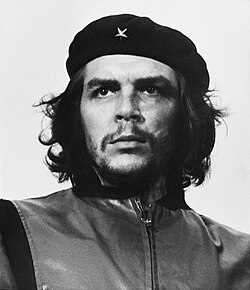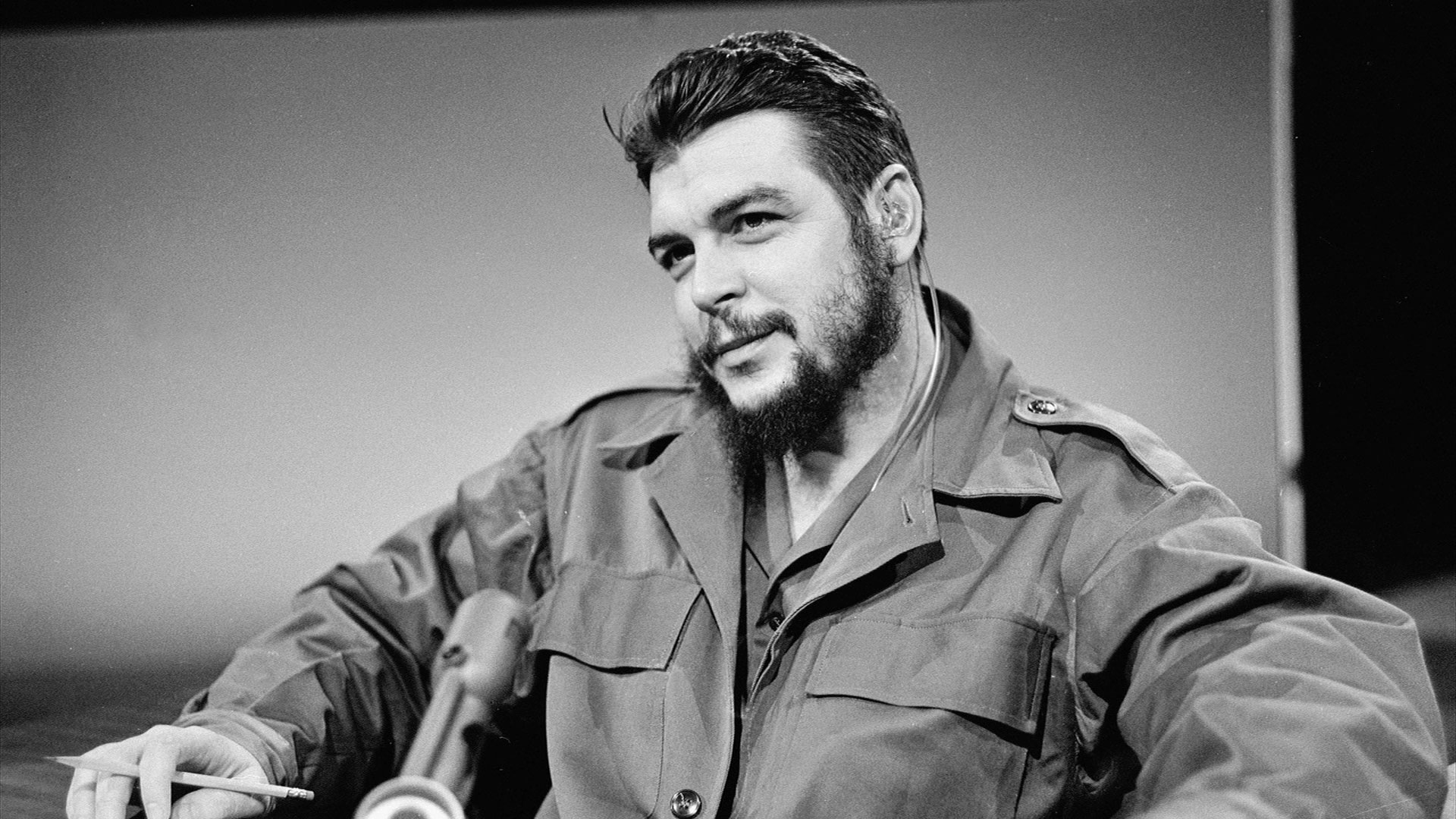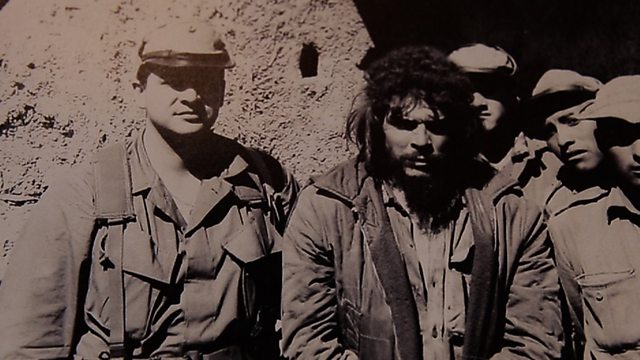Ernesto "Che" Guevara: A Revolutionary Icon
 Ernesto "Che" Guevara, the Argentine revolutionary, has left an indelible mark on the pages of history. His life, marked by an unyielding commitment to his ideals and an unwavering dedication to the cause of liberation, has inspired generations of activists, intellectuals, and dreamers worldwide. From his early days as a medical student to his iconic role in the Cuban Revolution and subsequent global revolutionary endeavors, Che Guevara's legacy continues to resonate profoundly.
Ernesto "Che" Guevara, the Argentine revolutionary, has left an indelible mark on the pages of history. His life, marked by an unyielding commitment to his ideals and an unwavering dedication to the cause of liberation, has inspired generations of activists, intellectuals, and dreamers worldwide. From his early days as a medical student to his iconic role in the Cuban Revolution and subsequent global revolutionary endeavors, Che Guevara's legacy continues to resonate profoundly.
Early Life and Education Ernesto Guevara was born on June 14, 1928, in Rosario, Argentina, to a middle-class family of Spanish-Irish descent. From an early age, he displayed intellectual curiosity and a rebellious spirit. He excelled academically and developed a passion for literature and poetry.
Ernesto Guevara was born on June 14, 1928, in Rosario, Argentina, to a middle-class family of Spanish-Irish descent. From an early age, he displayed intellectual curiosity and a rebellious spirit. He excelled academically and developed a passion for literature and poetry.
In 1948, Guevara began studying medicine at the University of Buenos Aires, where he became increasingly politicized. He witnessed firsthand the injustices and inequalities pervasive in Argentine society, fueling his desire for social change. During this time, he embarked on several motorcycle journeys across South America, which exposed him to the poverty and exploitation faced by the continent's indigenous populations.
The Cuban Revolution Guevara's transformative moment came in 1953 when he traveled to Guatemala and witnessed the progressive government of President Jacobo Árbenz being overthrown in a U.S.-backed coup. This experience radicalized him further and solidified his anti-imperialist convictions.
Guevara's transformative moment came in 1953 when he traveled to Guatemala and witnessed the progressive government of President Jacobo Árbenz being overthrown in a U.S.-backed coup. This experience radicalized him further and solidified his anti-imperialist convictions.
In 1955, Guevara met Fidel Castro and joined his revolutionary movement aimed at overthrowing the Cuban dictator, Fulgencio Batista. He played a pivotal role in the guerrilla campaign that ultimately led to the success of the Cuban Revolution in 1959. Guevara's strategic acumen, unwavering determination, and selfless dedication to the cause endeared him to Castro and earned him the moniker "Che," a term of endearment meaning "comrade" in Cuban Spanish.
Following the revolution's triumph, Guevara held various high-ranking positions in the Cuban government, including Minister of Industry, where he spearheaded initiatives to industrialize the country and redistribute land to peasants. His vision of a socialist society based on principles of equality and justice guided Cuba's early revolutionary reforms.
Internationalism and Revolutionary Struggles:max_bytes(150000):strip_icc()/che-guevara-sitting-at-a-desk-515582206-8365f574e8374578bb9430c056a2f741.jpg) Che Guevara's revolutionary zeal transcended national boundaries. He believed fervently in the global struggle against imperialism and sought to export the Cuban revolution to other parts of the world. In 1965, he famously declared his intention to "create two, three... many Vietnams," referring to the ongoing struggle against U.S. imperialism in Southeast Asia.
Che Guevara's revolutionary zeal transcended national boundaries. He believed fervently in the global struggle against imperialism and sought to export the Cuban revolution to other parts of the world. In 1965, he famously declared his intention to "create two, three... many Vietnams," referring to the ongoing struggle against U.S. imperialism in Southeast Asia.
Guevara's first international venture took him to the Congo, where he attempted to support Marxist insurgents in their struggle against the pro-Western government. However, the mission was fraught with challenges, including poor organization and lack of local support, leading to its eventual failure.
Undeterred by setbacks, Guevara set his sights on Bolivia, where he believed conditions were ripe for a successful revolutionary struggle. In 1966, he arrived in Bolivia in disguise, hoping to galvanize support among the rural peasantry and lead a guerrilla campaign against the government. However, the Bolivian military, aided by the CIA, swiftly crushed the insurgency. Guevara was captured on October 8, 1967, and executed the following day in the village of La Higuera.
Legacy and Iconography Che Guevara's death marked the end of his revolutionary journey, but his legacy endured. His image, captured in Alberto Korda's iconic photograph taken in 1960, has become a symbol of resistance and rebellion worldwide. Adorning posters, t-shirts, and murals, Guevara's visage serves as a rallying cry for those fighting against oppression and injustice.
Che Guevara's death marked the end of his revolutionary journey, but his legacy endured. His image, captured in Alberto Korda's iconic photograph taken in 1960, has become a symbol of resistance and rebellion worldwide. Adorning posters, t-shirts, and murals, Guevara's visage serves as a rallying cry for those fighting against oppression and injustice.
Despite his controversial legacy, Guevara remains a potent symbol of revolutionary ideals. His commitment to social justice, anti-imperialism, and solidarity with the oppressed continues to inspire movements for liberation around the globe. Moreover, his writings, including "Guerrilla Warfare" and "The Motorcycle Diaries," offer profound insights into his revolutionary thought and continue to influence activists and intellectuals.
Ernesto "Che" Guevara's life epitomizes the fervent pursuit of justice and liberation. From his early days as a medical student to his revolutionary exploits in Cuba and beyond, Guevara remained steadfast in his commitment to the cause of the oppressed. Though his life was cut short, his legacy endures as a beacon of hope for those striving to create a more just and equitable world. Che Guevara, in both life and death, remains an enduring symbol of revolutionary struggle and solidarity.
Controversies and Criticisms While Che Guevara is revered by many as a symbol of resistance and revolution, he is also a figure of controversy, with critics citing various aspects of his life and actions.
While Che Guevara is revered by many as a symbol of resistance and revolution, he is also a figure of controversy, with critics citing various aspects of his life and actions.
One of the primary criticisms leveled against Guevara is his role in the Cuban government's execution of political opponents and dissidents following the revolution. As head of the La Cabaña prison, Guevara oversaw trials of suspected Batista loyalists, many of whom were executed without due process. Critics argue that these actions contradicted Guevara's professed commitment to human rights and democracy.
Furthermore, Guevara's advocacy of armed struggle as the primary means of achieving social change has been a subject of debate. While some view his guerrilla warfare tactics as necessary in the fight against entrenched dictatorships and imperialism, others criticize them as inherently violent and authoritarian.
Additionally, Guevara's disregard for democratic processes and his authoritarian tendencies have been scrutinized. During his time in power, he advocated for a one-party state and centralized control, which contradicted principles of participatory democracy and freedom of expression.
Personal Myth and Popular Culture Despite these criticisms, Che Guevara's image has achieved near-mythical status in popular culture. His iconic photograph, taken by Alberto Korda, has become one of the most reproduced images in the world, symbolizing rebellion, idealism, and defiance.
Despite these criticisms, Che Guevara's image has achieved near-mythical status in popular culture. His iconic photograph, taken by Alberto Korda, has become one of the most reproduced images in the world, symbolizing rebellion, idealism, and defiance.
Guevara's likeness adorns everything from t-shirts to murals, often divorced from its original context and stripped of its revolutionary message. In many cases, his image has been commodified and commercialized, transforming him into a marketable symbol rather than a revolutionary leader.
Moreover, Guevara's life and legacy have been romanticized in films, literature, and music, further cementing his status as a cultural icon. Films such as "The Motorcycle Diaries" and "Che" portray Guevara as a heroic figure, glossing over the complexities and contradictions of his character.
Conclusion The legacy of Ernesto "Che" Guevara is complex and multifaceted, encompassing both admiration and criticism. As a revolutionary icon, he inspired millions with his unwavering commitment to social justice and liberation. His role in the Cuban Revolution and his internationalist efforts to support revolutionary movements worldwide have left an indelible mark on history.
The legacy of Ernesto "Che" Guevara is complex and multifaceted, encompassing both admiration and criticism. As a revolutionary icon, he inspired millions with his unwavering commitment to social justice and liberation. His role in the Cuban Revolution and his internationalist efforts to support revolutionary movements worldwide have left an indelible mark on history.
However, Guevara's legacy is not without controversy. Critics point to his authoritarian tendencies, his disregard for democratic processes, and his role in human rights abuses following the Cuban Revolution. Moreover, his image has been appropriated and commodified, often divorced from its original revolutionary context.
Despite these criticisms, Che Guevara remains a potent symbol of resistance and rebellion, inspiring countless individuals and movements to fight against oppression and injustice. His legacy serves as a reminder of the ongoing struggle for social justice and the enduring quest for a more equitable world. Whether revered as a hero or reviled as a villain, Che Guevara's impact on history is undeniable, and his legacy continues to shape the course of revolutionary movements around the globe.









































